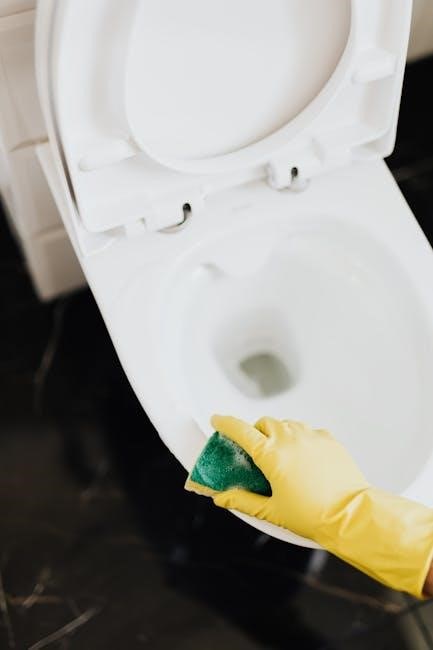chapter 7 medicare benefit policy manual
Summary
Explore detailed insights into Medicare coverage guidelines and reimbursement rules in Chapter 7 of the Benefit Policy Manual.

Chapter 7 outlines Medicare coverage for home health services, including eligibility, documentation, and payment systems, ensuring beneficiaries receive necessary care in their homes.
It provides detailed guidelines for providers to deliver skilled nursing, therapy, and other services under the Home Health Prospective Payment System (HH PPS).
Overview of Home Health Services
Home health services provide medical care to beneficiaries in their homes, ensuring access to necessary treatment without hospitalization. These services include skilled nursing, physical, occupational, and speech therapy, as well as medical social services and aide care. They are designed for patients who are homebound and require ongoing medical attention under a physician’s care. Home health care is typically short-term and intermittent, focusing on recovery, rehabilitation, or managing chronic conditions. Medicare covers these services under specific conditions, emphasizing cost-effective, patient-centered care. The Home Health Prospective Payment System (HH PPS) governs payments, promoting efficient delivery of services. An interdisciplinary approach ensures coordinated care, with a plan tailored to individual patient needs and goals, fostering independence and improving quality of life.
Historical Context and Purpose of Chapter 7
Chapter 7 of the Medicare Benefit Policy Manual was established to address the growing need for home health services, aligning with Medicare’s expansion beyond institutional care. Initially focused on hospital and skilled nursing facility coverage, Medicare recognized the importance of providing care in beneficiaries’ homes to reduce hospital stays and improve recovery outcomes. The chapter has evolved to reflect changes in healthcare delivery, ensuring clarity on coverage criteria, documentation requirements, and payment systems. Its purpose is to provide comprehensive guidance for providers, beneficiaries, and contractors, fostering consistency in administering home health benefits under Medicare Part A and Part B.

Eligibility Criteria for Home Health Services
Patients must be under a physician’s care, require skilled services, and be homebound to qualify for Medicare-covered home health services under Chapter 7 guidelines.
Patient Requirements for Coverage
To qualify for Medicare-covered home health services, patients must meet specific criteria. They must be under the care of a physician and require intermittent skilled nursing, therapy, or durable medical equipment. A patient is considered eligible if they are homebound, meaning leaving home requires significant effort and is not for non-medical purposes. The home health services must be medically necessary and ordered by a physician. Additionally, the care provided must be intermittent, not requiring full-time skilled care. These requirements ensure that home health services are appropriately utilized and align with Medicare’s coverage guidelines, as outlined in Chapter 7 of the Medicare Benefit Policy Manual.
Documentation of Clinical Need
Documentation of clinical need is crucial for Medicare coverage of home health services. The physician must certify the patient’s eligibility, detailing the medical necessity for skilled care. This includes the specific services required, such as skilled nursing or therapy, and how they align with the patient’s treatment plan. The certification must be completed before services begin and recertified every 60 days. Documentation must also include the patient’s functional limitations and how home health services will address them. Accurate and detailed records ensure compliance with Medicare guidelines and validate the clinical necessity of care provided in the home setting. Proper documentation safeguards both patient access to care and provider reimbursement.
Coverage Guidelines for Home Health Services
Medicare covers home health services, including skilled nursing, therapy, and medical supplies, when deemed medically necessary and provided under a physician-certified plan of care.
Skilled Nursing Services
Skilled nursing services under Medicare require a licensed nurse to provide care, such as administering medications, wound care, and monitoring health conditions, which must be medically necessary and ordered by a physician. These services are covered if they are part of a home health plan and cannot be safely performed by the patient or caregiver. The care must be intermittent or short-term, typically up to 28 hours per week, depending on the patient’s condition. Documentation must clearly justify the need for skilled nursing interventions to ensure compliance with Medicare coverage guidelines. This ensures that patients receive appropriate and cost-effective care in their homes.
Physical, Occupational, and Speech Therapy
Physical, occupational, and speech therapy services are covered under Medicare when they are medically necessary and ordered by a physician as part of a home health plan. These therapies aim to restore, improve, or maintain the patient’s functional abilities. Physical therapy focuses on mobility and strength, occupational therapy on daily living activities, and speech therapy on communication and swallowing disorders. Services must be provided by licensed therapists and documented in the patient’s plan of care. Coverage is limited to care that requires the skills of a therapist and cannot be safely performed by the patient or caregiver. The therapies must be intermittent or short-term, aligning with the patient’s specific needs and goals. Proper documentation is essential to ensure compliance with Medicare guidelines.

Medicare Payment Systems for Home Health Services
Medicare pays for home health services primarily through the Home Health Prospective Payment System (HH PPS), a case-mix adjusted system. CMS updates payment rates annually.
Home Health Prospective Payment System (HH PPS)
The Home Health Prospective Payment System (HH PPS) is a payment model used by Medicare to reimburse home health agencies (HHAs) for services provided. It uses a case-mix adjustment system, which classifies patients into different payment groups based on their clinical conditions, functional status, and other factors. This system ensures that payments more accurately reflect the cost of care for each patient. CMS updates the payment rates annually, considering factors like inflation and changes in healthcare practices. The HH PPS encourages efficient delivery of care while maintaining quality standards for beneficiaries receiving home health services.

Recent Updates to Chapter 7
Recent updates to Chapter 7 of the Medicare Benefit Policy Manual reflect CMS’s ongoing efforts to clarify and modernize home health service guidelines. These revisions, effective as of January 7, 2014, aim to enhance transparency and ensure compliance with current healthcare standards. Key updates include clarifications on the Home Health Prospective Payment System (HH PPS), documentation requirements, and the certification process for home health services. Additionally, CMS has introduced changes to streamline care coordination and improve beneficiary access to necessary services. These updates align with broader initiatives to optimize payment systems and ensure high-quality patient care in home health settings. Providers are encouraged to review the revised manual to stay informed on operational and billing changes.

Documentation Requirements for Home Health Services
Accurate and timely documentation is essential for Medicare coverage of home health services. This includes physician certification, recertification, and a detailed plan of care.
Certification and Recertification Process
The certification process ensures that home health services are medically necessary and ordered by a physician. Patients must meet specific criteria, including a face-to-face encounter.
- A physician must certify the need for home health care within 30 days of the start of services.
- Recertification is required every 60 days, confirming ongoing need for skilled care.
- Documentation must include the patient’s medical condition, treatment plan, and goals.
Accurate certification and recertification are critical for Medicare reimbursement and ensuring continuity of care.
Plan of Care and Coordination of Services
A Plan of Care outlines the specific services and goals for home health care, developed by the physician and healthcare team. It must be tailored to the patient’s needs.
The plan includes details like treatment goals, services provided, and visit frequency. Coordination among providers ensures seamless care delivery and achievement of outcomes.
- The physician must review and update the plan regularly.
- The home health agency implements the plan and ensures all services are medically necessary.
- Patient and caregiver involvement is crucial for effective care planning.
Proper coordination and documentation ensure compliance with Medicare requirements and optimal patient outcomes.